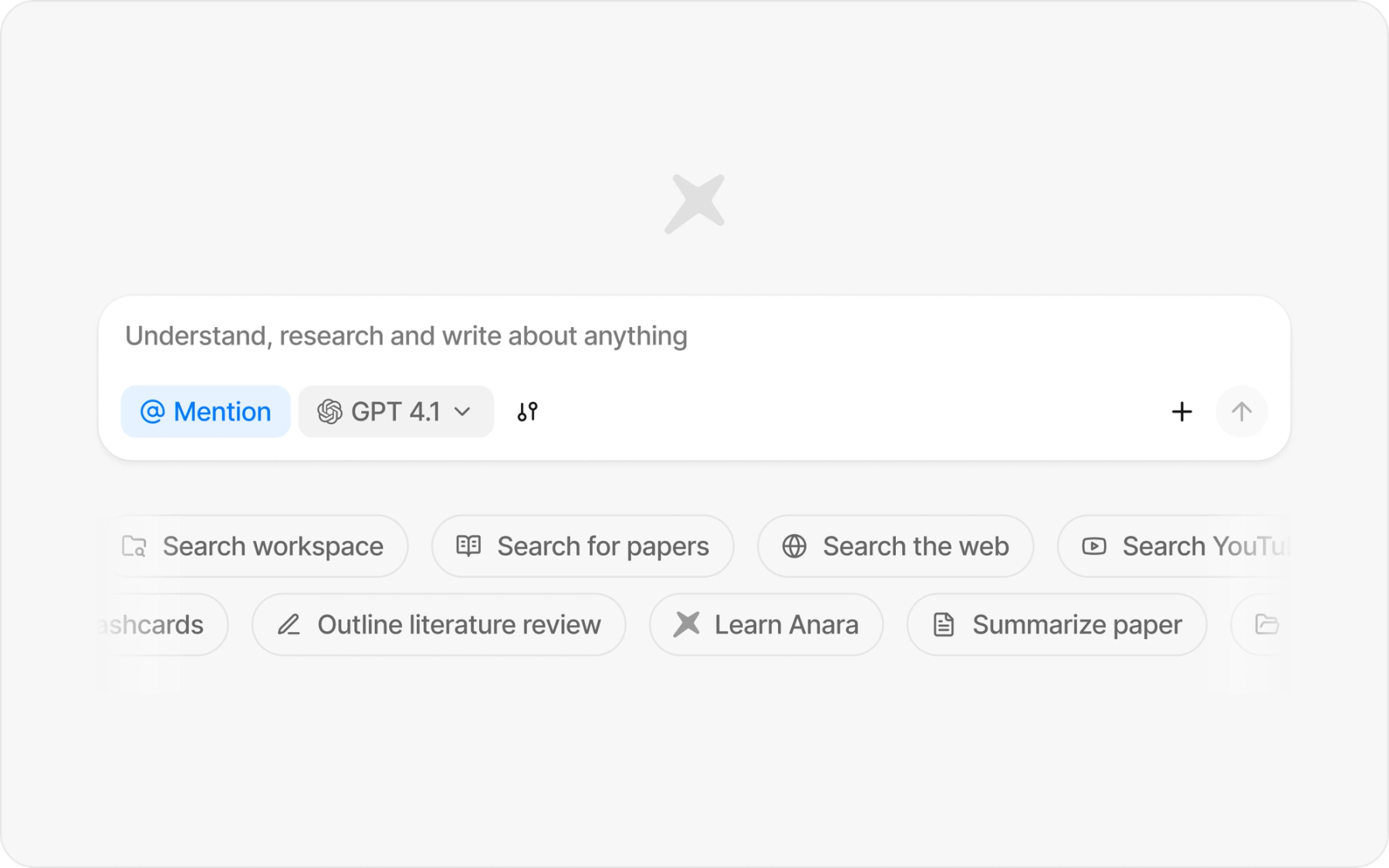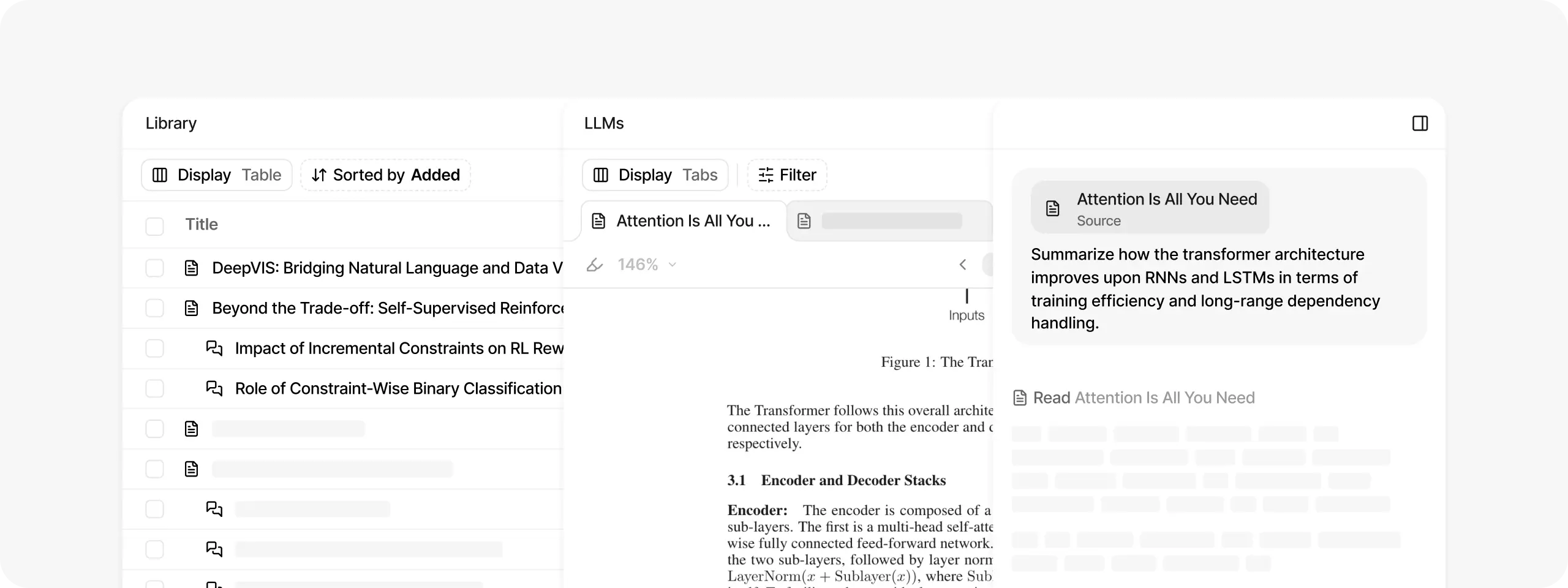Best research collaboration software & tools
Research teams need specialized collaboration software designed for scientific and academic workflows rather than general business tools. While platforms like Slack and Asana work for basic team coordination, research collaboration tools handle unique requirements: source verification, citation management, academic rigor standards, and seamless integration of diverse content types from papers to multimedia data.
This guide examines the best research collaboration software available in 2025, comparing platforms built specifically for scientific teams against general collaboration tools adapted for research use.
1. Anara
Anara is one of the best AI research collaboration tools for teams needing unified research workflows. It combines specialized AI agents, collaborative editing, and knowledge management in one platform where teams can work collaboratively across shared projects.
Anara builds its AI and automation tools around your curated library, while providing access to academic databases (PubMed, arXiv, JSTOR)to give you more control and trustworthy results. It focuses on collaborative features that general LLMs typically lack.

Key features
- Multi-source research synthesis: Draw insights from team libraries, academic databases, and web sources simultaneously, enabling collaborative analysis across diverse information sources
- AI chat with verification: Trustworthy, verifiable answers linked to documents source (whether internal or external)
- Real-time collaborative environment: Shared workspaces where team members can simultaneously deploy agents, edit documents, add comments, and maintain unified research workflows with admin controls and granular permissions
- Team knowledge management: Organize research materials into collections, @SearchWorkspace instantly to find information across all team files, notes, and previous agent interactions, creating institutional memory that persists across projects
- Integrated writing and citation: Generate team-consistent references using @CreateCitation while collaborative editing maintains shared document standards with robust citation management
- Multimedia collaboration: Teams can collectively analyze PDFs, videos, audio, and web content, supporting interdisciplinary research requiring diverse source types
Anara's source highlighting shows me the precise section where data comes from, so I can understand the context and share accurate information with my team.
A chemistry PhD turned clean tech CTO
Pricing
- Free ($0/month): 10 basic + 4 pro messages daily, 10 uploads/day, 120 pages per file - Sign up now!
- Pro ($12/month): Unlimited messages and uploads, premium AI models (Claude 4 Sonnet, GPT-4, etc.), 10,000 pages per file, collaborative workspaces
- Team ($18/seat/month): Everything in Pro plus team management, shared editing, admin controls, and dedicated account manager
Best for
- Interdisciplinary research teams
- Literature reviews
- Collaborative writing projects
- Teams working with multimedia research materials
The only research platform built for real-time team collaboration that your current tool can't match
Sign up for Anara free2. Zotero
Zotero remains the academic standard for reference management, offering group libraries and collaborative features built around citation collection and organization. While providing reliable citation management, it offers basic research collaboration compared to Zotero alternatives and requires supplementary tools for content analysis.
Key features
- Group Libraries: Create shared collections of references accessible to team members
- Collaborative organization: Team members can jointly organize references with shared tags
- Permission management: Assign read-only or editing permissions to different team members
- Limited collaboration: Basic sharing features compared to newer platforms
- Reference collection: Comprehensive reference collection and organization
- Citation formatting: Support for major academic styles
- Browser extension: Easy paper collection from web browsers
- Word processor integration: Connects with writing tools for citations
Pricing
- Free with paid storage options
Best for
- Traditional academic research workflows
- Established research teams
- Citation-heavy disciplines
- Teams requiring proven reference management
Considerations
Limited Zotero AI features; basic collaboration compared to modern platforms; requires supplementary tools for content analysis.
3. Elicit
Elicit specializes in academic paper discovery and systematic reviews, with access to 125M+ academic papers through Semantic Scholar. It excels at data extraction with validated accuracy metrics but offers a more structured workflow compared to Anara's flexible environment. While Elicit complements reference management software like Zotero, Anara aims to replace them.
Key features
- Team collaboration features: Real-time co-editing of Systematic Reviews and Notebooks
- Resource sharing: Team subscriptions provide pooled paper extraction limits (e.g., a 5-person team can extract data from up to 18,000 papers annually)
- Collaborative analysis: Team members can jointly create and modify tables with up to 30 columns
- Team management: Administrators can invite, remove, and manage team members through a centralized dashboard
- Access control: When members leave a team, they automatically lose access to team content
- Centralized billing: Single subscription manages billing for the entire team
- Paper discovery: Natural language queries across 125M+ academic papers
Pricing
- Free and paid individual plans available
- Team plans for up to 50 users priced at $79/mo per user
Best for
- Systematic reviewers and research teams
- Academic researchers in empirical fields
- Teams needing validated literature analysis with collaboration
- Large-scale systematic review projects
Considerations
Team collaboration features require higher-tier subscriptions; collaboration focused specifically on systematic reviews rather than general research workflows.
Not sure if Elicit is enough? This list of Elicit alternatives and competitors compares tools based on accuracy, collaboration, and content support.
4. Scite
Scite provides citation intelligence by analyzing how papers cite each other, offering context about whether citations support, contradict, or mention other research. It maintains a database of 200M+ articles with 1.2B+ citation statements, but remains primarily individual/institutional-focused with limited research collaboration features.
Key features
- Citation sharing: Team members can share citation context (supporting, contrasting, mentioning)
- Institutional tools: Team-wide analytics on citation patterns and research impact
- Reference verification: Collaborative checking of manuscript references for accuracy
- Limited team features: Basic sharing rather than real-time collaboration
- Smart citations: Shows citation context (supporting, contrasting, mentioning)
- Citation database: Access to 200M+ articles with 1.2B+ citation statements
- Academic integration: Strong institutional positioning and academic partnerships
Pricing
- Tiered pricing with academic discounts available
Unlike Scite.ai or Elicit that access pre-indexed databases, Anara boosts team collaboration by building collaborative intelligence around your curated library with paper discovery features.
Best for
- Researchers focused on citation analysis
- Academic institutions
- Systematic reviewers needing citation verification
- Research credibility assessment
Considerations
Focuses on citation relationships rather than content analysis; limited research collaboration tools; doesn't replace writing or analysis tools
5. NotebookLM
Google's NotebookLM enables AI-powered conversations with uploaded documents, providing source-grounded responses and document synthesis. The platform offers free access with good source attribution, but has limited collaboration features and is primarily designed for individual use rather than team workflows.
Key features
- Basic sharing: Share notebooks with team members through Google's permission system
- Comment functionality: Add comments to documents and AI-generated insights
- Limited team features: No specialized research team management capabilities
- Document chat: Chat interface with uploaded PDFs and documents
- Source grounding: AI responses with direct quotations from sources
- Google integration: Works within Google ecosystem
Pricing
- Free
Best for
- Teams already using Google Workspace
- Budget-conscious researchers
Considerations
Popular research app for students despite limited collaboration features; no citation management; primarily designed for individual use rather than collaborative research team workflows.
What business tools can researchers use for collaboration?
Many research teams rely on general collaboration platforms adapted for scientific work. While these tools provide valuable functionality, they create friction when research-specific needs arise.
Communication platforms
Research conversations lose connection to source materials, making it difficult to trace insights back to the research papers or data that sparked them.
- Slack
- Microsoft Teams
Project management
Designed for business task completion rather than research workflows requiring source verification and iterative discovery.
- Asana
- Trello
- Notion
Document collaboration
Strong document sharing capabilities but lacking research-specific features like citation management and source highlighting.
- Google Workspace
- Microsoft 365
Join millions of individual researchers and teams who use Anara daily
Sign up for freeWhy research teams need specialized collaboration software
Scientific collaboration has evolved from optional to essential. The vast majority of research publications now involve multiple authors, often spanning institutions and countries. Recent international agreements, like the EU-U.S. joint statement on collaborative research, highlight the global commitment to coordinated scientific effort addressing challenges like climate change and health crises.
Major breakthroughs—from the Human Genome Project to the International Space Station—demonstrate that modern scientific challenges require diverse expertise that no individual researcher possesses. Collaboration accelerates discovery, enhances scientific rigor through multiple perspectives, amplifies resources, and expedites the translation of findings into real-world applications.
The hidden friction in current approaches
Despite collaboration's proven benefits, research teams face documented challenges that general collaboration tools often exacerbate:
Information fragmentation
Research insights get scattered across email threads, chat channels, shared documents, and various specialized tools, making it difficult to maintain coherent project understanding or build systematically on previous work.
Lost research context
Critical discussions happen in communication tools that can't link conversations back to the source materials that sparked them. Months later, teams struggle to understand how they reached specific conclusions.
Tool switching overhead
Teams navigate multiple platforms daily—jumping between communication tools, document editors, reference managers, and analysis platforms—spending significant time on tool management rather than research.
Verification challenges
When team members share insights from AI tools or literature analysis, other team members often can't easily verify sources or understand the reasoning behind conclusions.
How to choose research collaboration platform?
The most productive research teams are moving from fragmented tool stacks toward unified platforms designed specifically for scientific collaboration. Research-specific collaboration platforms provide:
Source verification
Research demands transparency about information sources. Your collaboration platform should link claims and insights directly to source materials, enabling team members to verify accuracy and build confidently on shared findings.
Citation management integration
Academic work requires proper attribution within collaborative workflows. Look for platforms that handle citations seamlessly without forcing you to switch between tools for analysis and writing.
Multimedia content support
Modern research involves diverse content types beyond traditional papers. Ensure your research collaboration software handles videos, audio recordings, images, and web content alongside academic publications.
Real-time collaboration with context preservation
Research teams span institutions and time zones. Choose platforms that enable simultaneous work while maintaining the connection between discussions and source materials.
Academic rigor vs business efficiency
Business collaboration optimizes for speed and task completion. Research collaboration tools must prioritize accuracy, verification, and systematic building on previous work.
Key takeaways
- For unified research workflows with strong collaboration choose Anara for its real-time collaborative workspace, shared libraries, and integrated tools
- For systematic reviews with validated accuracy choose tools like Elicit for its team-based paper extraction and analysis capabilities
- For citation-focused research choose tools like Scite.ai for its citation intelligence and institutional features
- For individual researchers with occasional sharing choose NotebookLM for its free access and basic sharing capabilities
- For established citation workflows choose Zotero for its reliable reference management with group libraries
